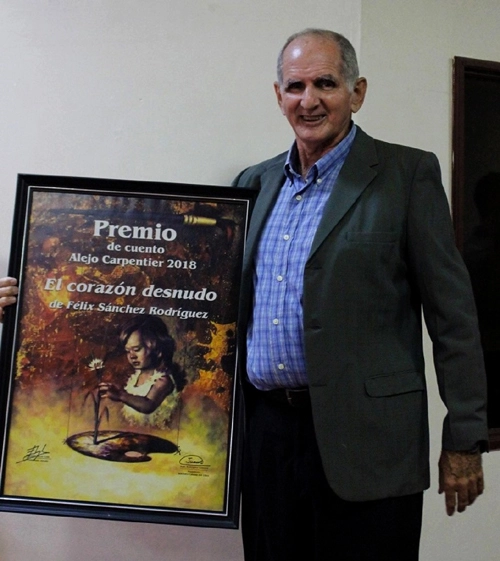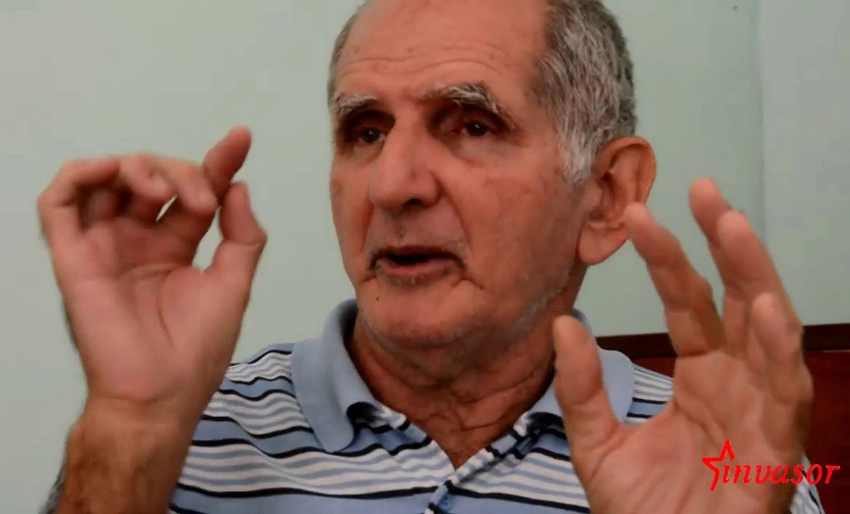There is no better phrase to define than “life is telling”. For writer Félix Sánchez Rodríguez, who is affable and happy conversationalist, and born in Ceballos, Ciego de Avila, in 1955, even when he does not even have a notebook and a pen in his hands, his look and ears are always ready to go deep within the most unsuspected secrets of life and reality.
All his books are born from this condition: whether they are short stories or novels, they bear the intimate mark of someone who knows how to observe and listen with accuracy.
“When you have something to say, say it; when you don’t, say it too. Always write”, suggested the great Augusto Monterroso -author of that jewel that is El dinosaurio ( The Dinosaur) – in the first command of his Decálogo del escritor (Decalogue of the Writer), and such an opinion is not insignificant, especially when it becomes a sign of a profession that has been exercised with great success, as is the case of a storyteller who knows how to set the course.
It is worth remembering that in its long journey from The Thousand and One Nights to the present day, the short story has become a literary expression of the highest ingenuity.
Thus, when it comes to genre, the descendants of the Infante Don Juan Manuel with his Libro de los ejemplos (Book of Examples), and Giovanni Boccaccio and his Deccameron -in the shadow of the night hours of Scheherazada-, are prone to the most unexpected bifurcations, although there is no doubt that, unique and indivisible with the original nature of the one who tells and then writes, the genre maintains its immutable freshness. It is in this, precisely, where the stories of Félix Sánchez best place their devices.
Although he has also published a handful of novels -among his highest achievements is Tulio y los elefantes verdes (Tulio and the green elephants), the witty and astute initiation of a marathon runner who, in the eighties of the 20th century, aspired to win a trip to the Democratic Republic of Congo as a prize, Félix is, par excellence, a short-story writer who has won almost all the prizes awarded in Cuba when it comes to the genre. And not with occasional books, but with titles that gather not a few pieces as remarkable as insightful.
Apart from the compassionate and serene look with which he develops stories and characters, Felix places himself far from the ordinary -despite often outlining details of a ubiquitous reality- to deliver a substantial narration. In the list of Cuban prizes, this is confirmed, among others, by books such as La suerte de Diana (Diana’s luck) – (Fernandina de Jagua Award 2010)-, also Detrás de las palabras (Behind words) – (Milanés Award, 2011)-, Figuras contra el viento (Figures against the wind) – (Guillermo Vidal Award 2012) and La mirada oblicua (The oblique look) – (City of Matanzas Award 2016).
Félix Sánchez Rodríguez, winner of the 2018 Alejo Carpentier Award in short story with the work El corazón desnudo (The naked heart), comes another book to the active bibliography of the narrator: fifteen pieces in which, as its title suggests, the very center of conflicts and protagonists is stripped of everything other than its propensity to reveal the most severe intimacy of each circumstance, though without losing sight of the sensitive that concerns a prudent, calm telling, ready to make the reader a co-participant attracted by the most equanimous judgment on what is narrated.

Felix invites in that title to a journey in which all anticipated certainty is excluded -the exergue of Antonio Tabucchi, taken from his novel Requiem, warns: “Do not leave me alone among people full of certainties. Those people are terrible” -. A few examples: some burglars in the style of a television cop (Caballeros de la noche – The knights of the night); some robbers of helpless elderly people (Los cazadores de almas – The souls hunters); or some military men on the lookout for smugglers on a night train (Los llamados de la selva – Th calls of the wild).
Three stories in El corazón desnudo are exemplary: That very humid day of the funeral -the children of an honest civil servant who, after the memorial service of their father, discovered unsuspected aspects of his life-, Ave de paso (Bird of passage) -the expectations generated in the press media by “the realization of a great national experiment”-, and, very specially, La sonrisa ajena (The smile of others), about a clown who is hired for birthdays, a character between the most casual roguery and the most piercing helplessness.
There is a detail that stands out in the stories of this author -and this is evidenced in more or less explicit ways-, and it is the fact of how he has known how to take advantage of the lessons of his elders, the disciple who delights in the only possible apprenticeship for his task: to be an “accomplice reader” -as a legendary storyteller named Julio Cortázar used to say-, as if he came from the alcoves of Scheherazada in the Far East, or perhaps from the Florence of 1348, where he shared with seven women and three men the journeys of the Deccameron.
In some notes from Franz Kafka’s Diaries, dated January 27, 1922, the author of not only of unforgettable novels, but also of excellent short stories, notes: “Observation of the facts by creating a higher form of observation; a superior form, which is not more acute and which, the greater is its superiority, the more unattainable it is (…), the more independent it becomes (…), the more unpredictable, joyful, ascending its path is. This is the path along which Felix’s happy tale travels along.
- Martín Arranz, the great maestro without a classroom - 12 de March de 2024
- Daniel: Concert with National Symphony Orchestra, my prize - 27 de February de 2024
- ArCAI to open a store at Casa Marco in Holguin - 19 de February de 2024

